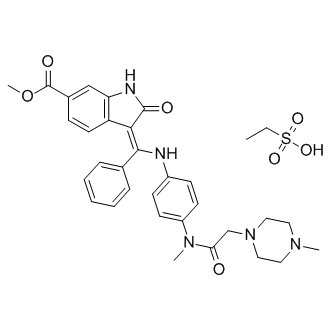| References: |
BIBF1120 inhibits PDGFR kinase activity of PDGFR alpha and PDGFR beta types with IC50 values of 59 nM and 65 nM, respectively. In addition, BIBF1120 suppresses the FGFR subtypes with IC50 of 60 nM, 37 nM and 108 nM For FGFR1, FGFR2, and FGFR3, respectively. BIBF1120 binds to the ATP-binding site in the cleft between the amino and carboxy terminal lobes of the kinase domain. The indolinone scaffold Forms two hydrogen bonds with the backbone nitrogen of Cys919 and the backbone carbonyl oxygen of Glu917 in the hinge region. BIBF 1120 inhibits proliferation of PDGF-BB stimulated BRPs with EC50 of 79 nM in cell assays. BIBF1120 at concentrations as low as 100 nM blocks activation of MAPK after stimulation with 5% serum plus PDGF-BB. In cultures of human vascular smooth muscle cells (HUASMC), BIBF1120 prevents PDGF-BB stimulated proliferation with an EC50 of 69 nM. In all tumor models tested thus far, including human tumor xenografts growing in nude mice and a syngeneic rat tumor model, BIBF1120 is highly active at well-tolerated doses (25-100 mg/kg daily p.o.). This is evident in the magnetic resonance imaging of tumor perfusion after 3 days, reducing vessel density and vessel integrity after 5 days, and profound growth inhibition. For the detailed information of Nintedanib (BIBF 1120), the solubility of Nintedanib (BIBF 1120) in water, the solubility of Nintedanib (BIBF 1120) in DMSO, the solubility of Nintedanib (BIBF 1120) in PBS buffer, the animal experiment (test) of Nintedanib (BIBF 1120), the cell expriment (test) of Nintedanib (BIBF 1120), the in vivo, in vitro and clinical trial test of Nintedanib (BIBF 1120), the EC50, IC50,and Affinity of Nintedanib (BIBF 1120), Please contact DC Chemicals. |























